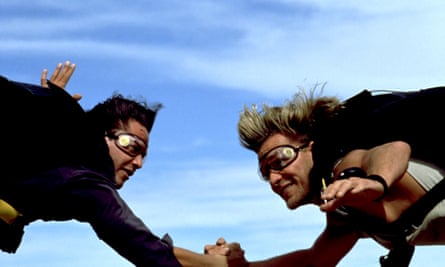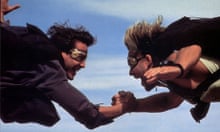The drive of Kathryn Bigelow’s 1991 surf-crime flick, Point Break, can be boiled down to two things: bodies and desire. As quarterback turned FBI rookie Johnny Utah, Keanu Reeves is earnest and eager for the adrenaline of crime-fighting; as balletic surfer-robber Bodhi, Patrick Swayze yearns for the rush that comes with risk, bolstered by the ocean’s raw energy.
To finance an endless summer, Bodhi and his crew of surfers form a bank heist quartet, donning masks of former US presidents and committing clean, almost untraceable robberies in revolt against a “system that kills the human spirit”. Following the hunch of his more seasoned partner, Agent Pappas (Gary Busey), Johnny infiltrates the Los Angeles surf scene to bust the group, deemed the “Ex-Presidents”. There, he finds himself intoxicated by the surfers’ euphoric lifestyle, caught in the swell of their enlightened anarchy.
Lori Petty plays Tyler, Johnny’s love interest and access point to the subculture, and she is wonderfully tough against Reeves’ boyishness. Yet the heat of their romance is surpassed by Johnny’s own relationship to Bodhi, as the men’s easy bond mutates into fixation.
During an interview Swayze gave at the film’s release, he expressed admiration that the dynamic between Johnny and Bodhi wasn’t “slap-ass, macho, jokey crap”. “I wanted to play it like a love story between two men,” he said. This is the richest reading of their dynamic: two adversaries, perfectly matched in some cosmically intimate way.
While some heist movies are clinically, almost pornographically interested in the mechanics of committing a crime, Point Break is concerned only as a matter of bringing Johnny and Bodhi into each other’s orbits. They are, in the simplest sense, stimulated by one another. Their opposing allegiances necessarily cast them as one another’s prey, and this destructive infatuation charges their dynamic while preventing them from ever committing real harm. “You want me so bad it’s like acid in your mouth,” Bodhi teases.
Bigelow recognises and embraces this thrill, rendering it stylistically in the way arched bodies glide across water, sunlight glistens through sea spray, and how the camera alternates between fluid and frenetic. Not to mention the film’s hair-raising skydiving sequences, or the five-minute foot chase shot with a “pogo-cam” to replicate the urgency of bodies in pursuit.
There’s something electric in how the boundaries between “right” and “wrong” are so sensationalised as to be operatic. Sure, Johnny is an appendage of authority chasing the epitome of lawlessness, but the traditional hero/villain dynamic is also transgressed by their natural kinship.
As Tyler observes early on, the pair share a certain “kamikaze look”. They’re motivated by similar things, chasing the same feelings, it’s just that one channels his desires through legally sanctioned avenues while the other seeks it elsewhere. To paraphrase Emily Brontë: whatever their souls are made of, Johnny and Bodhi’s are the same.

Granted, Reeves is sometimes stilted in his performance, but even this somehow works – Johnny is straining to follow FBI protocol as an agent of the state, while everything in his body craves a higher pleasure. There’s something captivatingly uncomfortable about the way the character sits in his own skin. What do we expect from a game of cat-and-mouse where the cat is yet to realise he too is a mouse?
Swayze fortunately balances out Reeves with a tremendously grounding presence, levelling his co-star’s more theatrical impulses. It’s an incredibly centred performance enhanced by Swayze’s controlled physicality, around which Johnny suddenly makes more sense: he’s itching for something, and his rival possesses exactly what he needs to be set free.
However, once Bodhi realises the FBI is after him, the raised stakes elicit something monstrous in him, dragging Johnny into his downward spiral. The film’s third act is propulsive and high-energy, concluding with an epilogue that, while bittersweet, stresses the genuine bond underlying the pair’s treacherous flirtation.
When Point Break was released, critics were quick to dismiss it as shallow, blathering machismo. But so rarely has the action genre anchored displays of masculine competition in such mutual respect and affection, daring to be outlandish and deadly serious all at once. In Bigelow’s hands, a potentially conventional story becomes a subversive, anti-establishment film about being seduced, blackmailed and radicalised by your crush.







Comments (…)
Sign in or create your Guardian account to join the discussion